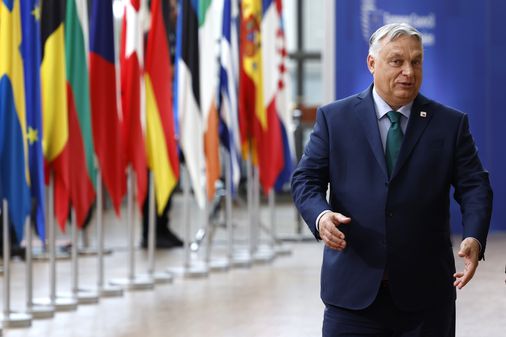Hungarian Prime Minister Viktor Orbán takes center stage at a moment when the success of hard- and far-right parties in recent elections has shaken Europe’s establishment and the world is mulling the possible return of a different populist firebrand, former president Donald Trump.
In France, a strong showing from Marine Le Pen’s far-right party led President Emmanuel Macron to dissolve Parliament and call snap elections that have thrown a key EU power into political chaos. Germany, meanwhile, is reeling over the success of the far-right Alternative for Germany, a party the country’s domestic intelligence service considers extreme.
Pro-European politicians fear a further weakening of unity in the 27-nation bloc, which is already experiencing anti-European sentiment in many regions, triggered by issues such as inflation, migration, and Russia’s brutal war on Ukraine that has brought in millions of refugees looking for shelter.
A National Rally victory in France’s run-off elections could have serious consequences not only for France but also for Europe. The far-right party is not only very critical of the European Union and pursues a “France First” policy, it also wants to move away from the strong partnership of France and Germany, the EU’s two biggest economies, which together have long been viewed as the motor of European integration.
German and Polish leaders said Monday it was too early to judge the election result before Sunday’s second ballot in France, but Poland’s prime minister warned of a shift to the right.
“This trend is really dangerous,” said Donald Tusk, the Polish leader, who had served as head of the EU Council, adding that the election result was “a very clear sign of what is going on, not only in France but also in some other countries of Western Europe.”
Germany’s minister for foreign affairs, Annalena Baerbock, said Monday in Berlin that “it cannot leave anyone cold when (…) a party is far ahead that sees Europe as the problem and not the solution,” German news agency dpa reported.
Orbán has strong ties to Trump’s political movement and is using this moment to send a message to far-right figures on both sides of the Atlantic: We are in this together and on the rise.
“National conservative, sovereignist and Christian forces are on the rise all across Europe,” he wrote on X this spring. “We are the worst nightmare of the #Brussels bureaucrats.”
“#MakeEuropeGreatAgain,” he added, “#MEGA” — a play on Make America Great Again, minus (for now) the red caps.
“Hungary in its current state would never pass the accession criteria to join the EU,” the letter continued. “Its criminal leadership should therefore not be allowed to represent the Union.”
But the presidency is going ahead. And, over the next six months, Hungary will need to find a balance between lambasting the European Union and using it to promote its interests.
Hungarian diplomats in Brussels have set out an agenda that sounds relatively mainstream: curbing migration, improving EU competitiveness, and bolstering European defense. But Orbán and close allies seem to see the next six months as an opportunity to troll Brussels, particularly with support dipping at home.
In a briefing on the Hungarian presidency, Zoltan Kovacs, an Orbán spokesman, said the goal was “change in Brussels.” However, EU-watchers are skeptical about how much Hungary will actually be able to do, because of the nature both of the job and of this particular political moment.
The rotating presidency of the Council of the EU requires countries to put aside their national interest and serve as EU-level conveners, setting and shaping the agenda. Hungary is stepping in just after the European Parliament elections, at a moment when EU officials and diplomats are more focused on securing new jobs than working on big files.
In recent years, Hungary has been a persistent EU holdout, most notably by slowing efforts to help Ukraine and thwart Russia. Member states have pushed ahead in seeking to prevent disruption, open accession talks — with Ukraine and Moldova, for instance — and approve more military aid for Ukraine.
“Even if Hungary wanted to block things or to orientate discussions in one way or the other, there won’t be that many legislative fights to conclude,” said Eric Maurice, a policy analyst at the European Policy Center, a Brussels-based think tank.
Instead, expect Hungary to focus on rhetorical wins, MAGA (or MEGA?) style. “The biggest challenge over the next six months will be to separate noise from actual impact,” said Zselyke Csaky, senior research fellow at the Center for European Reform, a London-based think tank, “because I expect a lot of noise.”
Material from the Associated Press was used in this report.
Source link : https://www.bostonglobe.com/2024/07/01/world/with-make-europe-great-again-hungary-taunts-allies-touts-hard-right/
Author :
Publish date : 2024-07-01 22:11:31
Copyright for syndicated content belongs to the linked Source.
